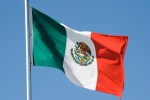In Mexico, More Than 60,000 People Are Missing Amid the Drug War

Activists hold signs during a rally to protest the Mexican government's handling of the missing Ayotzinapa 43 outside the Inter-American Commission of Human Rights as the commission is to hear testimonies on General Human Rights Situation in the State of Guerrero, Mexico March 20, 2015 in Washington, DC. Photo by Alex Wong/Getty Images
On Monday, the Mexican government announced that as many as 62,00 people in the country have disappeared since the start of its war on drugs in 2006.
Since President Andrés Manuel López Obrador took power in December 2018, he has made it a priority to placate the country, including a “hugs not bullets” strategy to fight crime and mass searches for those who have vanished. However, during his term, murder and disappearances have continued to rise, with the Guardian reporting that more than 31,000 people went missing in 2019 alone.
According to Karla Quintana, head of the country’s recently created national search committee, that addition puts the number of desaparecidos since 2006, when former President Felipe Calderón first set in motion his controversial response to drug cartels, to 61,637.
“We have to remember we’re talking here about lives and families and people who are still missing,” Quintana told a press conference in the capital, Mexico City, according to the newspaper. “These are statistics of horror behind which lie so many stories of such great pain.”

Since embarking on its search for missing people last year, the Mexican government has uncovered 873 clandestine burial sites. About three-quarters of the graveyards were found in the states of Sinaloa, Jalisco, Colima, Sonora and Chihuahua, all infamous for drug trade and wars. Officials have exhumed 1,124 bodies so far. Of them, just 395 have been identified and 243 were returned to their families.
According to Falko Ernst, a Crisis Group Mexico specialist, the findings and figures are helpful but are likely incomplete.
“We should keep in mind that disappeared data presented today is incomplete,” he tweeted. “Twelve states have presented no/only partial info … this is but a step toward grasping full conflict scope.”
